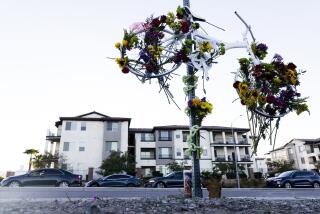POLITICS ’88 : Link to Panama Policy Called ‘Outrageous Lie’ : Angry Bush Denies Noriega Claim
An angry Vice President George Bush on Friday denounced as an “outrageous lie” a charge by Panamanian military leader Manuel A. Noriega that negotiations to entice him to leave Panama were engineered to help Bush’s political campaign.
Calling Noriega a “drug-related, indicted dictator,” Bush declared of the Panamanian’s allegations: “Discount ‘em. They are total lies.”
Bush made the remarks on the grounds of his family homestead here, where he spoke with reporters before opening a week of high-level campaign meetings called to firm up his policy positions before the general election campaign.
The vice president also testily objected to the frequency with which the now-defunct Noriega negotiations have been raised by Democratic presidential candidates, and to intimations that he had ignored long-ago reports of Noriega’s drug ties.
No ‘Evidence’
Bush has repeatedly said that while he did hear rumors of drug involvement, he knew of no “evidence” against Noriega until the general was indicted in February.
“I don’t like it being injected by Michael Dukakis and Jesse Jackson,” Bush said. “If they have some proof or if they have something other than nuance and insinuation, let them speak up.”
On Thursday night, Noriega claimed in a rambling, 75-minute speech that negotiations over his departure began in an Administration effort to protect a political campaign. The statement was unsubstantiated and clearly referred to Bush.
The suggestion also appeared curious because the vice president has publicly opposed the talks, in a rare break with President Reagan. The talks, under which Noriega’s drug indictments would have been dropped in exchange for his resignation as military leader, broke off Wednesday.
Bush said Friday that he does not believe that he will suffer political losses because the President chose not to take his advice. But he has clearly been irked that Democrats have been able to focus attention on an unpopular and divisive foreign policy initiative in which he plays a role.
The Noriega episode has essentially put Bush on the defensive about his foreign policy credentials in a campaign where he has long planned to make his diplomatic experience a major asset.
On Friday, he said criticism of him by Dukakis and Jackson was “political rhetoric from a number of people who have had no foreign affairs policy experience at all.”
On the Defensive
(Bush also has been on the defensive with regard to Atty. Gen. Edwin Meese III, who is being investigated for possible conflict of interest by independent counsel James C. McKay. The Washington Post reported Friday that Bush met privately with Meese recently to discuss the political fallout of Meese’s continuing legal difficulties, according to unnamed sources. The content of the meeting could not be learned.)
In response to questions Friday, Bush said he favors renewed Panamanian-U.S. negotiations that include participation by other Central American leaders, such as Costa Rican President Oscar Arias.
“You want to see it solved soon,” he said. “But I want to see a good deal, not a bad deal.”
Bush did not rule out bilateral talks, but he made clear that he continues to object to a deal in which drug charges against Noriega would be dropped.
“We want to bring him to justice,” the vice president said. “If we can find some way to get him out and still bring him to justice that would suit me just fine.”
Virtually guaranteed the Republican nomination, Bush on Friday moved to rev up his campaign with a series of meetings meant to add muscle to his thus-far skeletal policy proposals.
In meetings with prominent advisers Friday and today, Bush was due to discuss health, housing and education. On Tuesday and Wednesday the focus will shift to fiscal policy.
Among those gathered at his Kennebunkport compound Thursday were Republican governors John H. Sununu of New Hampshire, James R. Thompson of Illinois and John R. McKernan Jr. of Maine. Also present were Annelise and Martin Anderson, senior fellows from the Hoover Institution, former deputy Treasury Secretary Richard Darman, former Housing and Urban Development Secretary Carla Hills and Bonnie Guiton, assistant education secretary.
Bush said he hoped the sessions would produce “more specificity” on the issues and described the briefings as part of a process that will continue through the campaign. “I have broad philosophical outlines embedded here from which I won’t depart,” he said.
The vice president also sought to put a bright face on recent polls that show him well behind probable Democratic nominee Dukakis. “I don’t worry about it,” Bush said. “I like fighting back.”
More to Read
Start your day right
Sign up for Essential California for news, features and recommendations from the L.A. Times and beyond in your inbox six days a week.
You may occasionally receive promotional content from the Los Angeles Times.







